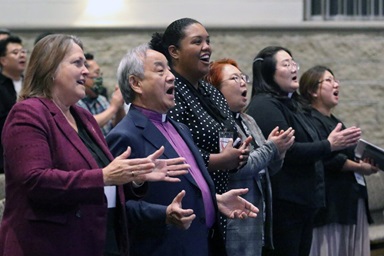“The profound truth is, you cannot be human on your own. You are human through relationship. You become human. … Ubuntu says, not that you are human because you think. You are human because you participate in relationship. It says a person is a person through other persons. This is what we say. This is what the Bible says. This is what our human experience teaches us.” — Bishop Desmond Tutu of South Africa.

Photo courtesy of Board of Global Ministries.
As a community of believers, United Methodists are called to embrace the fullness of human life. As a denomination, we strive for a connectional system representative of the Gospel that uplifts all people wherever they are.
Ubuntu is an African concept that embodies a way of life that when translated means “humanity,” where humanity is based on the understanding of interdependence and community life. Ubuntu is more than an expression, value or philosophical concept; it refers to a way of life that is visible in all spheres of human existence, a lifestyle that values the humanity of others as an imperative for one’s existence. It is lived recognizing that we are all created in the image of God and should do unto others as we wish it be done unto us. It says, “I am because you are. We are not born into a single family but a community.”
Commentaries
As an African and United Methodist looking forward to the Special Session of General Conference this month in St. Louis, I am reminded of these four values that speak to my being and why I believe God is speaking to the church through the leadership of our denomination.
United Methodists are connectional and in relationships around the world. Relationship is a key element of an interdependent and community life. Relationship is more than knowing faces and names — it includes sharing struggles and successes and living and working together on our path to a good earthly life and perfection to God.
We are brothers, sisters, siblings not because we think and act the same way but because we are all created in the image of God and were created to help one another. The image of God in us isn’t temporary or based on our perceptions or limitations but is a permanent reminder that we all originate from God, whose infinite grace and love compel us to uphold your dignity and value in our society.
Ubuntu encompasses virtues that invite us to a new way of life and our journey as Christians. In this way of life, human dignity is an inherent and inalienable virtue of all humans, from birth, regardless of any distinctive feature and circumstances, and should be protected by all at all times. When we recognize one another as created in the image of God, protection of one’s dignity and worth is a collective obligation tied to our existence as we share the pains and joys of humanity.
Ubuntu invites us to extend grace to everyone, regardless of our views or situations. God’s grace is available to all, everywhere and all the time. We recognize that our lives are defined by free and undeserved favor from God and that we are called to extend that grace to everyone. Our humanity isn’t defined by our efforts or status but by remembering that because we have freely received, freely we give. The consideration of others isn’t based on formulated expressions of exclusion, but in embracing all people. God does not exclude anyone from God’s expression of grace.
God reminds us of what God expects from us: To do justice, love mercy and walk humbly with our God. Thus, we share the collective responsibility to stand for one another when justice is denied to any one of us. We stand for one another because the safety and well-being of one is directly tied to the safety and well-being of all, injustice is rotational, and solidarity and love are the greatest weapons we have. Justice isn’t the decision of the majority but the moral responsibility that safeguards the welfare and integrity of all members of the family.
In a global but polarized world where individualism has led to racial profiling, injustice to the poor and vulnerable, religious intolerance, tribalism and nepotism, xenophobia, rejection of refugees, and discrimination to people based on sexual orientation, we have failed to live to a higher call of Jesus to love another just as God loves us. Ubuntu is a reminder that we share a common origin and destiny, that our welfare is tied to another, and that we have the collective responsibility to protect the sacred dignity of our fellows, extend grace and seek justice for all, for our welfare is dependent on their welfare.
We invite all United Methodists around the world to consider Ubuntu, relationship, dignity, grace and justice as they seek to follow Christ and share God’s love in the world. May our humanity and Christianity grow together.
Longe is a native of the Congo who currently lives in the U.S. He is a certified lay minister.
News media contact: Vicki Brown at (615) 742-5470 or [email protected]. To read more United Methodist news, subscribe to the free Daily or Weekly Digests.
Like what you're reading? Support the ministry of UM News! Your support ensures the latest denominational news, dynamic stories and informative articles will continue to connect our global community. Make a tax-deductible donation at ResourceUMC.org/GiveUMCom.



